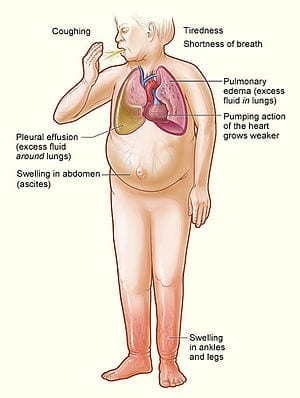
The heart failure drug digoxin, used less and less since it “failed” in its 1997 clinical trial, may do something no drug has achieved since: reduce by 34 percent the chances that heart failure patients will be admitted to the hospital within 30 days of first taking it, according to an analysis highlighted today at the American College of Cardiology’s 62nd Annual Scientific Session and published online simultaneously in The American Journal of Medicine.
Preventing frequent admissions became a national priority last year as the Centers for Medicare and Medicaid Services (CMS) penalized thousands of hospitals an estimated total of $300 million for having above average 30-day readmission rates in patients with pneumonia, heart attack or heart failure.
CMS leveled the penalties as part of federal healthcare reform and with the rationale that many admissions and readmissions are preventable if care is handled properly. While that is a matter of debate, one in five Medicare recipients is readmitted within 30 days at an annual cost of $17 billion, with heart failure the most common culprit. Digoxin is known to reduce acute heart failure symptoms like shortness of breath, the kind of frightening experience that sends people racing to emergency rooms.
“This is the first study to suggest that any drug, old or new, can dramatically reduce the risk of 30-day, all-cause hospital admission among older heart failure patients,” said Ali Ahmed, M.D., M.P.H., professor in the divisions of Gerontology, Geriatrics, & Palliative Care and Cardiovascular Disease within the School of Medicine at the University of Alabama at Birmingham (UAB). Ahmed today presented the work by researchers from UAB and Birmingham Veterans Affairs Medical Center as part of the ACC’s Late Breaking Clinical Trials session.
Obsessed with reducing mortality
The current study is a re-analysis of data from the original Digitalis Investigation Group (DIG) trial, which was funded by the National Heart, Lung, and Blood Institute (NHLBI) and the Veterans Affairs Cooperative Studies program. DIG was a randomized, controlled clinical trial conducted in the early 1990s in which digoxin failed to lower the risk of death (all-cause mortality) in patients with chronic heart failure. The treatment did, however, reduce the risk for hospitalization due to worsening heart failure by 28 percent when patients were followed for three years.
The Latest Bing News on:
Digoxin
- Sinus Arrhythmia: What’s Normal vs. Irregularon May 9, 2024 at 12:24 pm
Medically reviewed by Christopher Lee, MD Sinus arrhythmia is a variation in the heart's sinus rhythm, usually caused by changes in a person's breathing cycle. It's a common finding, especially in ...
- 7 common poisonous plants to keep away from children - why are they not safe?on May 9, 2024 at 2:05 am
From foxgloves to lilies and hydrangeas, here are some of the most poisonous plants to keep away from children according to a home expert.
- An Update on the Role of Digoxin in Older Adults with Chronic Heart Failureon May 7, 2024 at 5:00 pm
Older adults with symptomatic HF should be prescribed digoxin in low doses starting at 0.125 mg/d. For persons with HF who are 75 years and older, are women, have renal insufficiency, are ...
- Digoxin - Uses, Side Effects, and Moreon April 23, 2024 at 5:00 pm
What is digoxin used for? Digoxin is commonly used for the following conditions. Digoxin may also be used for other conditions as determined by your healthcare provider. How does digoxin work ...
- 6 Supplements You Should Never Take If You're Over 60, Doctors Sayon April 9, 2024 at 4:04 am
Doctors say these are the worst supplements to take if you're over 60. Some can cause health issues for seniors.
- Ventricular Rate Control in the Elderly: Is Digoxin Enough?on April 8, 2024 at 5:00 pm
Digoxin can slow this rate, but its efficacy during exertion may be limited. Alternatives, or additions, to digoxin therapy include the blockers and diltiazem or verapamil. This review discusses ...
- Page settingson January 12, 2024 at 9:21 pm
Digoxin is used to treat heart failure, usually along with other medications. It is also used to treat certain types of irregular heartbeat (such as chronic atrial fibrillation). This medication ...
- Lanoxin Injectionon October 15, 2021 at 9:44 am
Digoxin 0.25mg/mL; soln for IV or IM inj. Lanoxin (digoxin) Injection, 500 mcg (0.5 mg) in 2 mL (250 mcg [0.25 mg] per mL); box of 10 ampules or 10 vials. Lanoxin (digoxin) Injection Pediatric ...
- Digoxin Oral Solutionon September 16, 2020 at 3:08 pm
Digoxin 0.05mg; per mL; lime-flavored; contains alcohol 10%. Renal dysfunction: reduce dose. Sinus node disease. Incomplete AV block. Accessory AV pathway (Wolff-Parkinson-White syndrome).
- Concerns raised about digoxin safetyon June 3, 2019 at 5:02 am
Digoxin is used extensively in combination with other medications in the treatment of heart failure, and is often prescribed to patients with atrial fibrillation — a kind of irregular heartbeat ...
The Latest Google Headlines on:
Digoxin
[google_news title=”” keyword=”digoxin” num_posts=”10″ blurb_length=”0″ show_thumb=”left”] [/vc_column_text]The Latest Bing News on:
Reducing heart failure
- ‘I'm a Cardiologist and This Is the Type of Fruit I Eat Almost Every Day for Heart Health’on May 11, 2024 at 4:25 pm
Related: 'I'm a Cardiologist, and This Is the Type of Fish I Eat At Least Once a Week for Heart Health' American Heart Association recommends scientific research shows Related: This Is the #1 Sign ...
- Common cooking ingredient could reduce dementia mortality risk, study suggestson May 11, 2024 at 2:30 pm
Infusing more olive oil into your diet could pay big dividends in cognitive health, a new study from the Harvard T.H. Chan School of Public Health suggests. Experts offered insights.
- Cardurion Pharmaceuticals Presents Positive Clinical Results from CARDINAL‑HF Phase 2a Clinical Trial of PDE9 Inhibitor in Patients With Heart Failureon May 11, 2024 at 6:00 am
Cardurion Pharmaceuticals, Inc. (“Cardurion”), a clinical-stage biotechnology company developing next-generation therapeutics for the treatment of car ...
- How stress levels can impact heart healthon May 10, 2024 at 7:37 pm
Certain stress levels can cause a person to experience a heart attack. Someone in the U.S. has a heart attack every 40 seconds, according to the Centers for Disease Control and Prevention. KOAT health ...
- Heart Disease Newson May 10, 2024 at 5:00 pm
Cardio-Fitness Cuts Death and Disease by Nearly 20% Apr. 29, 2024 — Groundbreaking new research finds that an increased cardio fitness level will reduce your risk of death from any cause by nearly ...
- nib teams up with cardiology provider to reduce heart disease readmissionson May 10, 2024 at 4:50 am
nib Group (nib) and cardiology provider Advara HeartCare have launched an initiative to tackle unplanned readmissions for heart disease patients.
- Exercise Reduces Stress and Risk of Heart Diseaseon May 9, 2024 at 9:00 am
Exercise is essential for heart health, especially for those with depression and other mental health disorders. | Cardiology ...
- Reducing heart disease with lifesaving Northern Heart Centreon May 8, 2024 at 9:24 pm
From diagnosis, to treatment and everything after, we are boosting the level of health care for Tasmanians with heart disease every step of the way. “The Northern Heart Centre is a key part of our ...
- What's Behind Major Rise in Heart Failure Deaths?on May 3, 2024 at 12:53 pm
After falling for over a decade, the death rate climbed for several years and now is about the same as in 1999.
- Certain Gut Bacteria Linked to Lower Heart Disease Riskon May 2, 2024 at 11:50 am
Microorganisms in the digestive tract may help reduce heart disease risk by helping the body process cholesterol, a new study suggests.
The Latest Google Headlines on:
Reducing heart failure
[google_news title=”” keyword=”reducing heart failure” num_posts=”10″ blurb_length=”0″ show_thumb=”left”]









